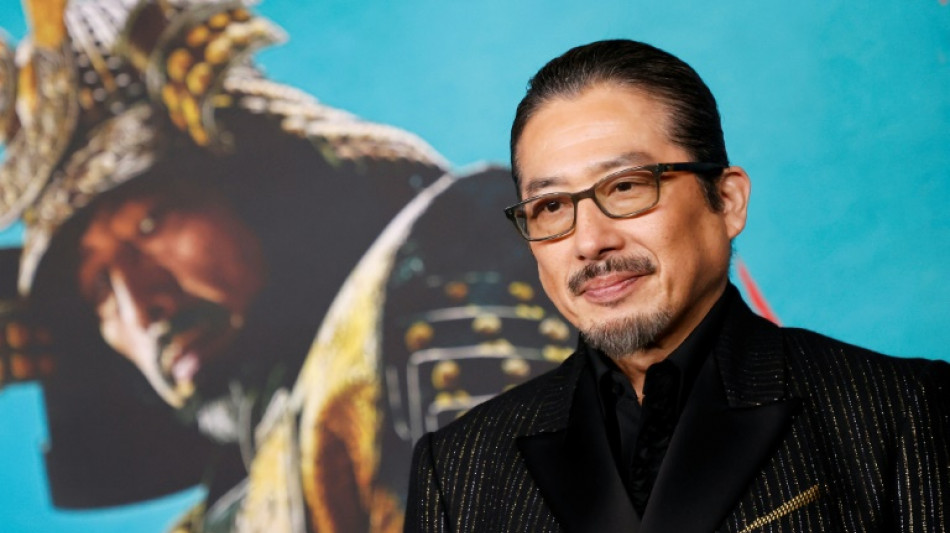

Hiroyuki Sanada: actor and producer driving TV's 'Shogun'
Japanese actor Hiroyuki Sanada's star turn in "Shogun" earned him a nomination for the Emmys, which take place on Sunday, but he was also a driving force behind the huge success of the TV series as co-producer.
It is the first time in Sanada's nearly six-decade career, in which he rose to fame in action blockbusters, that he has taken on a double role in front of and behind the camera.
The 63-year-old is credited with bringing a new level of cultural and historical authenticity to the period drama set in feudal Japan after decades of hit-and-miss Western interpretations.
"I always felt there were limits to what I could say as an actor," Sanada said in a YouTube video published by the Disney-owned FX network, which made "Shogun".
"I had to be reserved, think about how to say things, consider timing, and be careful," he said.
But as a producer, he could offer guidance without hesitation on how best to portray the samurai era, deftly switching between his two jobs.
"After I finished filming, I would take off my wig, change into my casual clothes, and go back to the site to continue my consulting work."
Sanada plays strategic warlord Toranaga, a character based on Tokugawa Ieyasu -- one of Japan's most famous shogun generals in the 17th century.
He is nominated for best actor in a drama at the Emmys. It is one of a staggering 25 nods overall, with 14 statuettes already awarded to the series at a pre-gala ceremony.
The actor told a press conference in Tokyo earlier this year that he was attracted to the role because Ieyasu brought an end to an "era of warfare and created a long period of peace".
"In a world of constant conflict, I think such a heroic figure is needed," he said.
- Action star -
Born in Tokyo, Sanada began acting young -- at the age of five -- in a movie starring Sonny Chiba, a martial artist and actor who later appeared in "Kill Bill".
As a teenager, he developed his martial arts skills at the Japan Action Club, founded by Chiba.
At the same time, he also studied traditional Japanese dance, an experience he described as "essential for playing a role in a period drama, from dressing and gestures to sword-fighting".
"Not only the techniques, but also the conviction I learnt through training is the cornerstone of my spirit," Sanada wrote in a message on the dance studio's website.
The actor starred in many action movies in the 1980s, and also tried his hand at singing at a time when pop idols were all the rage.
As his star rose in Japan, Sanada appeared in TV dramas and played a main role in the "Ring" horror phenomenon.
His career went global when British actor Nigel Hawthorne saw him in a Japanese-language production of "Hamlet" that renowned director Yukio Ninagawa brought to London.
Hawthorne suggested that Sanada play the Fool in a 1999 Royal Shakespeare Company production of "King Lear", also directed by Ninagawa, which was in English.
Sanada "works twice as hard as the average Japanese actor, although he doesn't show it," Ninagawa said in an NHK documentary in 1999.
Sanada was later awarded an honorary Member of the Order of the British Empire (MBE) for being the first Japanese actor to perform with the RSC.
- 'Last Samurai' -
In the early 2000s, he starred in the Oscar-nominated "The Twilight Samurai" and his first Hollywood film, "The Last Samurai" starring Tom Cruise.
When he felt something was wrong with the portrayal of Japanese culture during filming, Sanada would point it out.
"I didn't care if it turned out to be my first and last Hollywood film," he told the Nikkei daily earlier this year.
Impressed by his passion, the director asked Sanada to join the post-production process, and he stayed for six months -- on his own dime -- to help out.
Wanting to "bring down the walls that divide the East and West," he decided to leave Japan to move to Los Angeles.
Since then, he appeared in films such as "Rush Hour 3", "The Wolverine" and "Bullet Train".
Sanada said "Shogun" came at a time when he had been "asking myself what I should do if I were to work on a Japanese subject overseas".
"And this is how far I have come," he said in the FX YouTube video.
(H.Leroy--LPdF)




